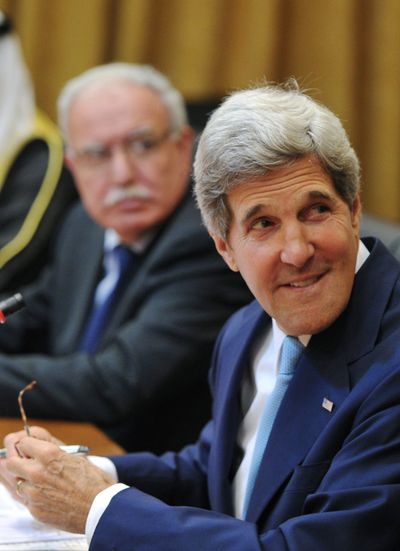Israel set to vote on Palestinian prisoners
Release would lead to preliminary negotiations

GAZA CITY, Gaza Strip – In April 1993, Omar Masoud and three accomplices broke into a European aid office in Gaza City, grabbed a young Israeli lawyer working there and stabbed him to death.
Israel arrested Masoud a month later and sentenced him to life, meaning he was doomed to die in prison one day for killing the lawyer in the name of the Popular Front for the Liberation of Palestine, a small PLO faction.
Now Masoud, along with dozens of other long-term Palestinian prisoners, is up for release as part of U.S. Secretary of State John Kerry’s attempt to restart Israeli-Palestinian talks after five years of diplomatic paralysis.
Israel’s Cabinet is being asked to approve a prisoner release in principle today as part of a Kerry-brokered deal to get the two sides back to the table.
The Cabinet vote would pave the way for a preliminary meeting of Israeli and Palestinian negotiators in Washington on Tuesday, followed by up to nine months of talks in the region on setting up a Palestinian state alongside Israel. Such a deal has eluded Israelis and Palestinians for two decades and they have low expectations.
A prisoner release – particularly of lifers with “blood on their hands” – would go a long way toward giving Palestinian President Mahmoud Abbas a popular mandate to give talks another shot, even if many Palestinians believe Israel’s hard-line prime minister, Benjamin Netanyahu, is not serious about a deal.
Israelis tend to view the prisoners as cold-blooded terrorists, and early releases of security prisoners in previous swaps elicited vociferous objections from the public, including Supreme Court appeals.
For Israel’s government, approving the release of prisoners it refused to free in the past – even if in stages and linked to progress in talks – poses the most difficult test so far of its professed willingness to reach a peace deal.
But in a statement late Saturday, Netanyahu said prime ministers “are required from time to time to take decisions that are against public opinion – if it is important to the state,” signaling he is pushing for Cabinet approval of the release.
Abbas, meanwhile, briefed reporters on the terms of the upcoming negotiations, based on what he said were Kerry’s assurances to him. He said the American invitation would state that the talks will be about establishing a Palestinian state next to Israel, based on the 1967 borders and with mutually agreed upon land swaps.